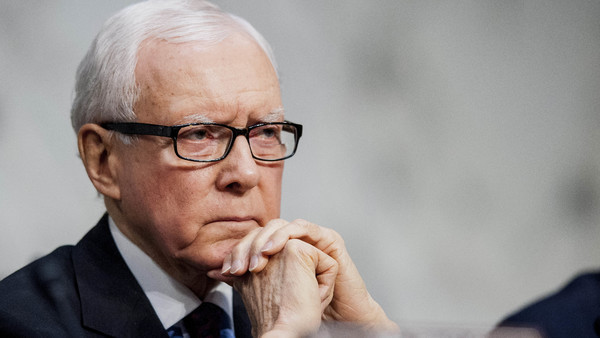
Sen. Orrin Hatch’s (R-Utah) recent broadside against the credit union tax exemption left a lot of people saying, “Huh?”
Hatch had already announced he would not seek another term in the Senate this year, and Congress had just completed tax overhaul legislation, which could have been a logical place to raise the issue (although Congress may have to pass a “technical corrections” bill to clean up some of the legislation’s messiest parts.)
Part of the answer could lie in the senator’s relationship with A. Scott Anderson, president/CEO of Zions Bank, which is headquartered in Salt Lake City and has some $65 billion in assets.
Anderson, who is involved with dozens of civic efforts in Utah, happens to be chairman of the “Orrin G. Hatch Foundation.”
The Hatch Foundation plans to develop a Hatch Center at a university in Utah. The foundation has not yet announced which university will house the center.
“The Hatch Center will be an incubator for policy scholarship, a forum for political discourse, a springboard for civic engagement, as well as a world-class repository of modern American legislative history,” according to the foundation’s website.
It sounds similar to the types of institutions established by longtime Washington policymakers.
Now, the Hatch Foundation is not accepting any government money, so it’s raising money from the private sector. And the center’s fundraising efforts have been criticized, as foundation officials are attempting to raise money from groups with legislative issues before Hatch’s committee.
After all, that’s where the big bucks are.
For instance, Politico reported last year that Hatch – who had not yet decided whether he would run for another term – was holding a “Fly Fishing and Outdoor Adventure Weekend” on Aug. 11 and 12 at the Montage Deer Valley resort in Park City, Utah. The following two days, the foundation was holding its “First Annual Golf Tournament and Outdoor Adventure Weekend” at the same resort, according to Politico.
Convenient, yes. Illegal, no.
Meanwhile, foundation head Anderson has been a critic of credit union activities.
For instance, in 2015, Anderson wrote a letter to CUNA raising “significant concerns” about the NCUA’s plan to expand business lending.
The expansion would not be fair to banks, he argued.
“If credit unions want to expand into functions traditionally performed by banks that pay taxes, then they should be willing to forego their tax-exempt status as well,” Anderson wrote.
Hatch’s staff said there is no connection between the Finance Committee and the foundation.
When asked why the senator is raising the issue at this late date, a spokesperson said, “This investigation, as with all committee investigations, is driven by the merit of the issue. Chairman Hatch has long examined the role of tax-exempt entities and raised the issue as part of a wider-ranging review of the organizations, which has included university endowments, private museums and others. It’s part of his oversight responsibilities to make sure that entities granted tax exemption are operating in line with Congress’ intent when granting that exemption.”
Hatch Foundation Director Trent Christensen said, “The Orrin G. Hatch Foundation has taken appropriate steps to ensure that its activities comply with all applicable ethics requirements.”
Anderson did not respond to requests for comment.
Now, even if Anderson heads the foundation and Hatch is now espousing the views of the big bankers, there’s nothing illegal going on.
But the “Campaign Legal Center,” a group that pushes campaign finance reform, has questioned the link between members of Congress and private fundraising. The center, in a package of government reform proposals presented at the start of the current Congress, questioned the wisdom of allowing private groups, such as the Hatch Foundation, to keep their donors secret.
“Donations to these connected organizations, often millions of dollars, raise the possibility of potential conflicts of interest and provide an avenue for the buying and selling of influence and access to the politician after whom the organization is named,” the center said in its proposal. “While these foundations may perform valuable and worthwhile work, contributions to these non-profits are widely viewed as an effective means to ‘get on the radar screen’ of powerful members of Congress.”
The center gave five examples, the first of which is the Hatch Foundation.
“In 2016, political backers of Sen. Orrin Hatch (R-Utah) launched a multimillion-dollar fundraising campaign to solicit funds for the creation of the non-profit Orrin G. Hatch Foundation,” the group said. “The fundraising operation has ties to Sen. Hatch’s political fundraiser, Heather Larrison, and includes Utah-based donors, K Street lobbyists and major corporations representing the pharmaceutical and technology industries. Many of these lobbyists/donors represent clients with interests before the Senate Finance Committee of which Sen. Hatch is the chairman, raising a potential conflict of interest.”
Again, there’s nothing illegal here. All indications are that everyone is following the letter of the law.
But if you’re wondering why Sen. Hatch is mouthing the words of many of the nation’s banks, this might be part of the answer.
 David Baumann is a Correspondent-at-Large for CU Times. He can be reached at dbaumann@cutimes.com.
David Baumann is a Correspondent-at-Large for CU Times. He can be reached at dbaumann@cutimes.com.


